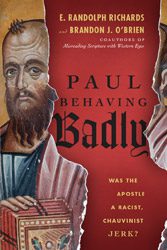Paul has often been a lightning rod for the church. Jesus may be called “meek and mild,” but no one has ever thought of Paul that way. From the beginning, he challenged everyone—apostles, church members, Roman authorities, fellow Jews. His writings are dense, passionate, and at times, as Peter wrote, “hard to understand.” Yet his zeal only matches his confidence in the power of Christ to change the world.
Brandon O’Brien and Randolph Richards have tackled Paul’s reputation head-on. Point by point, they weigh the charges against him—accusations of racism, misogyny, meddling, and more. Patheos had a chance to ask the authors some questions that readers might have as they consider Paul.
In some ways, Pauline material has “fallen on hard times.” People seem to want to pit Paul against Jesus. How do you tackle that division?
At some level, Paul has a PR problem. Whether or not people believe Jesus is the Son of God, they still seem to give him the benefit of the doubt. Jesus says nice things to the Samaritan woman at the well (John 4), so today people think, “Jesus treats women well.” The story of Jesus forgiving a woman caught in adultery is world famous (John 7:53-8:11), so Jesus is known as loving and forgiving. They sweep under the rug Jesus calling the Canaanite woman a dog (Matthew 15:26). Paul is known as anti-women despite promoting women as church leaders (Romans 16:1, 7). Few remember Paul urging the forgiveness of an offending brother (2 Corinthians 2:5-8). It is Jesus who talks all the time about hell; Paul never does. Yet Paul is the one often called judgmental, not Jesus. Many people expect to see cantankerous behavior from Paul and, for that reason, they see in his letters.
What kind of man do you think Paul really was? Would you have gotten along with him?
We suspect Paul was a Type A, driven person. He seems to have been very comfortable with subordinates but not so much with peers—there were lots of Timothys (i.e. disciples) in his life and very few Lukes (i.e., colleagues). Brandon might have gotten along with Paul—he’s younger and Paul liked to mentor. Randy is older, and the two of them might have butted heads.
Paul might have been hard to get along with for all the same reasons that he would be easy to respect. He seems like a man of conviction, with a clear sense of calling that he didn’t waver from. Stubbornness is what made Paul return to Lystra after just being pelted with stones and run out of town. We admire Paul’s stubbornness in that situation but resent it other times. We don’t like that Paul says “follow my example” (1 Corinthians 11:1), but when he is brave enough to preach to angry mobs, face dangerous storms, and witness even to governors and kings, we wish we were that brave and could follow his example.
Do you think Paul is as offensive to people today as he was to the Romans and to the Jews? How can we explain this in an age where we equate Christian with “being nice”?
No. He is almost certainly less offensive to people today than he was to the Romans and Jews of his own day. His views were even more countercultural back then. He had the audacity to tell a Roman man how to treat people in his own house. We say a man’s home is his castle, but in first-century Rome they really meant it. It was off limits. He told the Jews that their Law and their Temple had been replaced by the Spirit of God. That’s a real no-no.
None of this is to say that Paul endorsed being adversarial. After all, Paul commanded, “as far as it depends on you, live at peace with everyone” (Romans 12:18). Kindness, gentleness, and humility were important to Paul—they among the fruit of the Spirit (Galatians 5:22). But he never sacrificed the Gospel to spare someone’s feelings.
Paul encourages believers to imitate him. This seems really arrogant. Can you explain this?
Context helps here. Remember that when Paul was preaching and teaching, the gospels had not yet been written. Paul tells the Galatians, “Before your very eyes Jesus Christ was clearly portrayed as crucified” (Galatians 3:1). The Galatians weren’t at Calvary. They saw the example of Jesus’s self-sacrifice lived out by Paul. Paul was slandered, abused, and even stoned in Galatia (Lystra) but loved the Galatians and sacrificed for them. The example they saw of a godly, Christian life was the one they saw in Paul. If they wanted to live a life worthy of Christ, the only way they could know what that meant was by watching, and imitating, Paul’s example.
Besides, people were much more accustomed to the idea of discipleship in the first century. Every good philosopher or rabbi had disciples who learned from them—that’s just how education worked at the time. (It is how modern medicine is often taught today. Residents follow the teaching physician and are supposed to imitate him or her.) And you didn’t just learn ideas from a teacher. You learned lifestyle, attitudes, and actions by imitating a master.
In several of the chapters, you place Paul in a contrary position to culture, and yet he is rarely as draconian about his arguments as he could have been. What lessons can we take away from this about our own engagements with culture?
Paul never focused on issues, the way we often do today. He was concerned first and foremost—and maybe exclusively—about the Gospel of Christ. Of course the Gospel has implications for all of life, including relationships and social institutions and so on. But Paul’s starting place was to get the Gospel right, to urge his readers to recognize and embrace the power of Christ in their lives, and trust that the Spirit would do His work in them. The balance Paul had to strike was pointing both Jewish-background believers and Gentile-background believers toward the path of righteousness without instituting a new law. He ran afoul of the many cultures he engaged because he was always warning against self-righteousness on the one hand and self-indulgence on the other. After all, Paul had both former Pharisees and Epicureans in his churches. His teachings usually had one, and often both, angry with him. Today, Christians can often find themselves in the same place.












